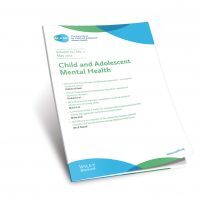Loneliness and social isolation
-

Loneliness and Early Career Researchers: An Evidence-Based Perspective
Loneliness is a significant and often overlooked issue among early career researchers (ECRs). This phenomenon can have profound implications for both personal well-being and professional development. Recent studies have highlighted the prevalence of loneliness among academics, particularly those in the early stages of their careers, suggesting that this issue warrants serious attention from both research and policy perspectives.
Read more -

Identifying characteristics of adolescents with persistent loneliness during COVID-19: A multi-country eight-wave longitudinal study
Open Access paper from JCPP Advances – ‘Using the widespread social restrictions associated with the COVID-19 pandemic, which precipitated loneliness in many, we aimed to examine adolescents’ loneliness profiles across time and the demographic predictors (age, sex, and country) of more severe trajectories.’ Laura Riddleston (pic) et al.
Read more -

Depressive symptoms and loneliness among early adolescents: a psychometric network analysis approach
Open Access paper from the JCPP – ‘This study investigates: (a) the symptoms of depression that are connected to loneliness; (b) the role played by loneliness in the network of depression symptoms; and (c) whether the method used to measure loneliness (single-item direct or multi-item indirect) affects the relationship of loneliness with depressive symptoms’. Paweł Grygiel (pic) et al.
Read more -

A cross-lagged twin study of emotional symptoms, social isolation and peer victimisation from early adolescence to emerging adulthood
Open Access paper from JCPP Advances – ‘Our study highlights the necessity to intervene early in adolescence to prevent the escalation of emotional symptoms over time and to consider social isolation and peer victimisation as important risk factors for the long-term persistence of emotional symptoms.’ Geneviève Morneau-Vaillancourt (pic) et al.
Read more -

Covid-19’s impact on Loneliness and Mental Health: A Study of Schizotypal Traits and Paranoia
The Covid pandemic lockdown has affected us differently, with some people being impacted more than others. Extensive research has indicated that lockdowns – which broadly include isolation measures, such as, in the UK, being required to stay at home unless for essential reasons – have disproportionately impacted individuals with higher levels of paranoia.
Read more -

Review: Interventions addressing loneliness amongst university students: a systematic review
Open Access paper from the CAMH journal – “Loneliness is detrimental to mental health, with university students at higher risk of feeling lonely than other population groups”. Olivia Betty Ellard et al.
Read more -

How isolation and secrecy fuel the self-harm flames
During Mental Health Awareness month in May 2022 – focused on the role of loneliness – Nip in the Bud listened to experts and those who have been through it to understand the vicious cycle of trying to cope alone. (TRIGGER WARNING: Please be aware that this blog discusses self-harm, including personal experiences of self-harm.) This blog was published by Nip in the Bud on 27 May 2022.
Read more -

Interventions for reducing loneliness seem effective in young people
Meta-analyses of interventions aimed at reducing loneliness among young people are distinctly lacking in the field. Now, Alice Eccles and Pamela Qualter have addressed this gap by compiling a review for Child and Adolescent Mental Health on interventions to reduce loneliness in young people.
Read more -

Dr. Maria Loades ‘COVID19 and social isolation, school-based interventions, and CBT’ – In Conversation
Dr. Maria Loades discusses Covid19 and its implications for young people’s mental health, the Rapid Systematic Review exploring the repercussions of the pandemic on social isolation and loneliness.
Read more -

Allowing young children to play with their friends must be prioritised as soon as possible when lockdown is eased
Play is so essential for children’s wellbeing, this blog summarises why it’s essential for children to resume playing with their peers as soon as possible.
Read more